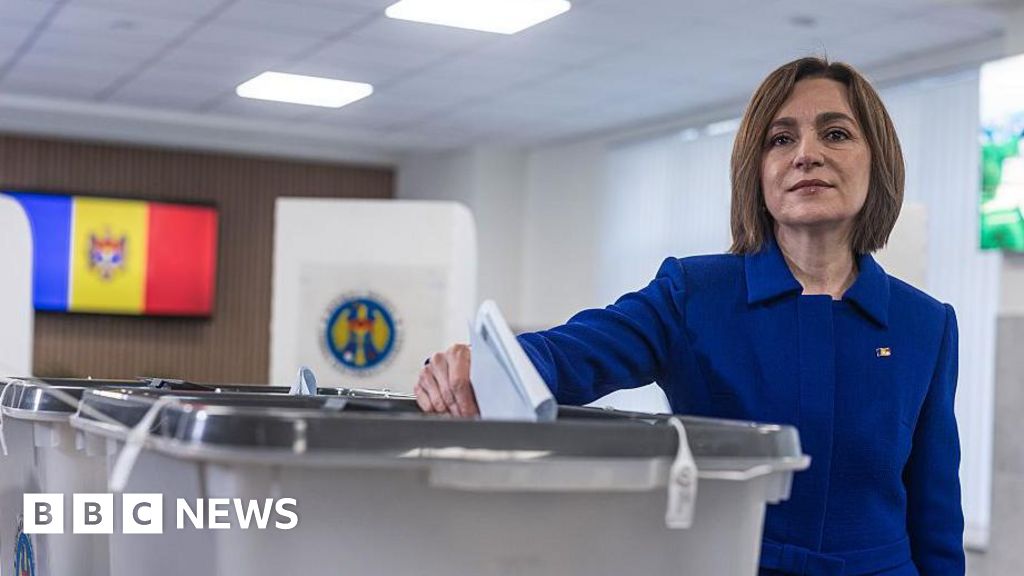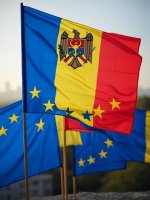Moldova’s pro-European Party of Action and Solidarity (PAS) has won a decisive majority in parliamentary elections widely viewed as a turning point for the country’s future relationship with the European Union.
Preliminary results show PAS securing around 50.1% of the vote, giving it an estimated 55 seats in the 101-member parliament. The pro-Russian Patriotic Electoral Bloc came in second with 24.2%, followed by the Alternativa Bloc, the populist Our Party, and the right-wing Democracy at Home party — all of which crossed the threshold to enter parliament.
The victory bolsters President Maia Sandu’s agenda of closer ties with the EU. Casting her ballot, Sandu accused Moscow of “massive interference” and said she voted “to keep the peace” while affirming Moldova’s path toward EU integration.
The campaign was marked by tensions and security concerns. Authorities reported bomb threats at polling stations in Romania, Spain, Italy, and the U.S., as well as attempts at voter manipulation. Police said they detained three suspects linked to Transnistria’s security services, accusing them of plotting to provoke chaos with pyrotechnics and flammable materials.
Sandu also pointed to reports of illegal voter transportation and ballot tampering. Igor Grosu, PAS leader, said Russian efforts to sway the election had been “huge,” but praised state institutions for safeguarding the vote.
Russia, for its part, denied any involvement, calling the allegations “unsubstantiated.” Pro-Russian leader Igor Dodon dismissed claims of interference and rallied his supporters, though the results confirmed PAS’s majority.
Moldova’s large diaspora once again played a key role, with hundreds of thousands casting ballots abroad, echoing their strong support for Sandu in the 2020 presidential election.
The election outcome is expected to accelerate Moldova’s EU membership ambitions, while further straining its relations with Moscow.

 www.bbc.com
www.bbc.com
Preliminary results show PAS securing around 50.1% of the vote, giving it an estimated 55 seats in the 101-member parliament. The pro-Russian Patriotic Electoral Bloc came in second with 24.2%, followed by the Alternativa Bloc, the populist Our Party, and the right-wing Democracy at Home party — all of which crossed the threshold to enter parliament.
The victory bolsters President Maia Sandu’s agenda of closer ties with the EU. Casting her ballot, Sandu accused Moscow of “massive interference” and said she voted “to keep the peace” while affirming Moldova’s path toward EU integration.
The campaign was marked by tensions and security concerns. Authorities reported bomb threats at polling stations in Romania, Spain, Italy, and the U.S., as well as attempts at voter manipulation. Police said they detained three suspects linked to Transnistria’s security services, accusing them of plotting to provoke chaos with pyrotechnics and flammable materials.
Sandu also pointed to reports of illegal voter transportation and ballot tampering. Igor Grosu, PAS leader, said Russian efforts to sway the election had been “huge,” but praised state institutions for safeguarding the vote.
Russia, for its part, denied any involvement, calling the allegations “unsubstantiated.” Pro-Russian leader Igor Dodon dismissed claims of interference and rallied his supporters, though the results confirmed PAS’s majority.
Moldova’s large diaspora once again played a key role, with hundreds of thousands casting ballots abroad, echoing their strong support for Sandu in the 2020 presidential election.
The election outcome is expected to accelerate Moldova’s EU membership ambitions, while further straining its relations with Moscow.

Moldova's pro-EU party wins vote mired in claims of Russian interference
The election was seen as critical for Moldova's EU path, and President Maia Sandu warned the country's future was in danger.
